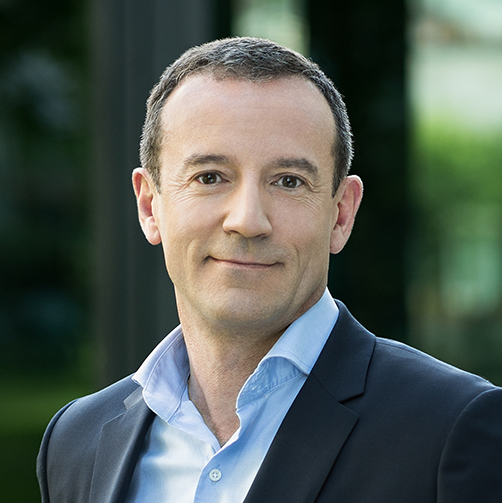Q: You increased your operating profitability for the second consecutive year. Does that mean Orange Polska is already well on its way to sustainable growth?
We are very satisfied with our financial performance over the last year. EBITDAaL (EBITDA after Leases) increased by 7% and we reported revenue growth for the first time in 13 years. Indeed, our operating profitability increased for the second consecutive year. Let me remind you that in 2018 we brought a multi-year downward trend to an end. If we look at the trend in our key financial metrics in the last four years we see constant improvement, which makes me confident that we are on a good path for sustainable growth. This was the key goal of our Orange.one strategy that we announced in 2017. These achievements are compelling evidence that the strategy is working, and is being executed well in a challenging environment. Let me briefly remind you of its key pillars. On the consumer market, we focus on winning Polish households by offering them convergent packages supported by the rollout of our fibre network. On the business market, we are supporting our customers in their digital transformation. We are also boosting our efficiency: redesigning our processes for simplification and cost optimisation.

These achievements would not be possible without the concerted efforts of our entire organisation. It is very motivating for our managers and all employees to see that revenue decline is not inevitable, and that our Company is able to grow.
At the same time we are aware that this growth takes a huge amount of effort, and sustaining it will require a lot of further work. Please note that we are under constant pressure from structural declines in our high-margin legacy business lines, and we have to compensate for these declines with growth in other areas. Looking forward, we will be working to achieve growth with a better balance between direct margin and cost optimisation.
Q: What would you say were the most important developments for you in 2019?
2019 was very exciting for us and full of important developments. I’ll mention three which really stand out.
In my view, the most important development last year was a change in the telecom market landscape here in Poland: we saw probably the first ever tariff price increases implemented by operators according to a ‘more for more’ formula. We revised our prices for the majority of services for mass-market customers, and were the first on the market to make these price changes. This led to a change in investor perceptions of our sector and its future growth prospects, which was reflected in the share price of Orange Polska and our competitors.
Secondly, I would like to mention the acquisition of BlueSoft. We focus mainly on organic development and rarely pursue acquisitions, so we selected BlueSoft with great care. We did it because we see that synergies between the ICT area and core telco services for business customers have become higher than ever. Polish enterprises are digitising their businesses, which means that on top of connectivity and infrastructure they also need software engineering, cloud and other digital enablers. BlueSoft perfectly complements our existing competencies in the ICT area, and significantly increases our competitive edge against both other telecom operators and pure ICT companies. We expect the first revenue synergies to be realised in 2020.
Finally, I would like to highlight Orange Flex: a new and highly innovative offer that we launched last year. We believe it sets a new benchmark for the future of telecommunications services. Flex is a mobile offer that can be managed via a smartphone app. It is fully digital and very flexible. There are no loyalty contracts. Customers can change between different data plans depending on their needs – as often as every month. We designed and launched it ourselves because we recognise the market’s appetite for digital products; we want to lead the change and actively disrupt the industry.
Q: Are you satisfied with the results of your ‘more for more’ strategy so far? Will it be continued?
Let me start by describing the background to its implementation. On the one hand, fierce price competition on the Polish market over the years has made the price of telecom services very low compared to other EU countries. On the other hand, we see the changing needs of our customers reflected in growing demand for data transmission and faster fixed broadband services. In this environment, we are asking customers to pay us more in return for the additional tangible benefits that they want. Higher prices apply exclusively to newly signed contracts with customers in the acquisition Q&A with Jean-François Fallacher, Orange Polska CEO STRATEGY Orange Polska Integrated Report 2019 47 and retention process. We are pleased that our approach was well received by our customers, especially on mobile. Customer net additions in mobile handset offers last year were better than in 2018 and churn rate was lower. We see more challenges on the fixed market, where the competitive environment is not helping a value player like Orange.
In terms of what might happen next, for obvious reasons we never comment on our future commercial actions. All I can say is that higher prices are in line with our strategy focused on value and growth of revenues and profits. They contribute to gradual improvements in our financial trends. We strongly believe that a ‘more for more’ strategy is key to long-term value creation at Orange Polska, and its implementation builds more confidence in the success of our turnaround. Please note that in February this year we launched a new offer for small business customers which is another example of our ‘more for more’ approach.
Q: Your leading shareholder’s strategy presentation in December 2019 raised the topic of infrastructure: fibre and mobile. How relevant are they for Orange Polska?
For many different reasons, the topic of potential monetisation of infrastructure assets has recently become much more important in the strategies of telecom operators – including Orange Group. However, it’s important to take into account the specifics of local markets.
Poland has been mentioned by Orange Group in the context of so-called FibreCo. Let me explain what is behind this concept. Orange Polska has been heavily investing in fibre network rollout since 2015. This year will be the final year of this programme, as we outlined in our current strategy. We will reach around 5 million households at the end of 2020 – around 40% of all households in Poland. However, considering the high demand for this technology among customers and our strong belief that fibre will constitute a competitive advantage for us for the coming decades, we see the potential to densify our network a little bit more. At the same time we want to remain cautious in terms of the overall level of our capex, bearing in mind that the 5G network rollout begins in 2021. In this context, we are investigating the idea of finding a partner with whom we could share future investments in fibre, beyond 2020. We are currently analysing different scenarios so it is too early for details. We will address this project in our new strategy.
In terms of mobile towers this investment approach is much less appealing for Orange Polska, at least for now. Please note that the agreement with T-Mobile relating to the use of each other networks already brings a lot of optimisation to our mobile network. I would not say we will never do anything in this area, but our current priority is the FibreCo project.
Q: Climate protection has become an urgent public issue. What is Orange Polska’s attitude to climate challenges?
The issue of our environmental impact and what we do to mitigate it has always been central to our CSR strategy initiatives. Our crucial areas of environmental impact are electricity consumption and its related emissions, and electronic waste generation, so this is where we focus our activities.
Today, we look at these issues within the broader perspective of our overall impact on climate change. The Orange Group’s new strategy, Engage 2025, embraces a number of initiatives to minimise our negative impact on the environment. We are setting emission reduction targets at the Orange Group level, with the goal of making our operations carbon neutral by 2040. In the timeframe covered by the current strategy, i.e. by 2025, the Orange Group will have reduced its CO2 emissions by 30% versus 2015 by increasing the share of energy from renewable sources, and implementing energy-saving technologies on our network. When it comes to our environmental initiatives, Orange Polska acts in line with the Group’s development priorities, while also responding to Polish society’s expectations at the local level.
Q: What are the key priorities for 2020?
2020 will be the last year of our current strategy implementation. Our key goal is obviously to sustain the growth that we achieved in the past two years. We will continue to execute our value strategy in all business areas. At the outset of 2020 forecasts for Poland’s macroeconomic situation continued to be favourable and this year’s challenges were supposed come mainly from the external inflationary environment. However, with the outbreak of the COVID-19 pandemic in March the world around us has changed almost beyond recognition. This will obviously significantly impact our operations; however, I believe that Orange Polska remains relatively immune to the impact of the pandemic. Data and voice connectivity has become more essential than ever to the needs of consumers and businesses. Despite this unprecedented situation, we are working intensively on the new strategy that we will present to the market in due course.
A very significant milestone in 2020 will obviously be the auction for spectrum to be used with 5G technology. The Polish government’s timetable was to allocate these frequencies by mid-year. However due to COVID-19 pandemic it is likely to be delayed. We are counting on an efficient and transparent process. Over the past two years or so we have run numerous successful tests of 5G technology, so we will be ready for the rollout of the 5G network as soon as we obtain frequencies.

